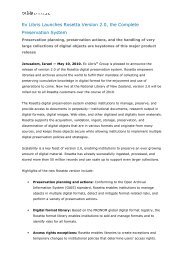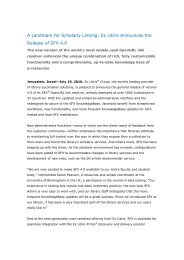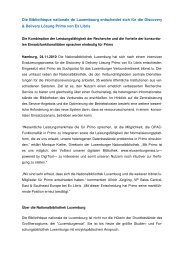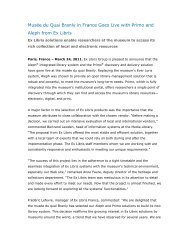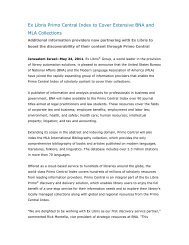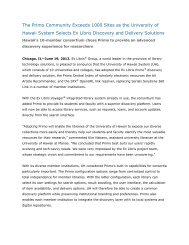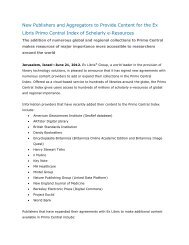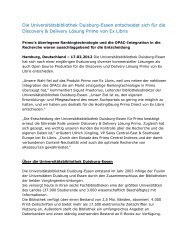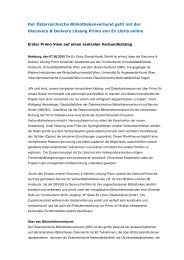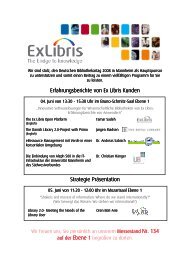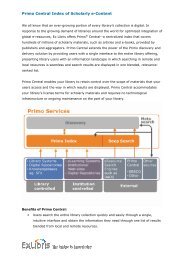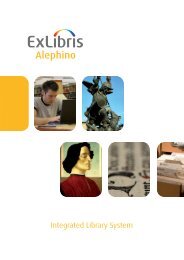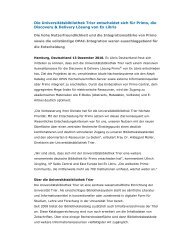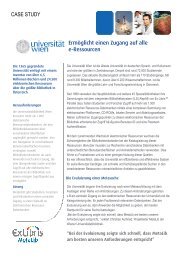October 2005 Issue - Ex Libris
October 2005 Issue - Ex Libris
October 2005 Issue - Ex Libris
Create successful ePaper yourself
Turn your PDF publications into a flip-book with our unique Google optimized e-Paper software.
Verde Leads Industry in ERM<br />
Standardization Initiatives<br />
Verde, <strong>Ex</strong> <strong>Libris</strong>’ Electronic Resource Management (ERM)<br />
system, enables library staff to manage their resources at all<br />
levels: the interface, the package, and the constituent (e.g.<br />
journal, book). Previous editions of the <strong>Ex</strong> Librian have<br />
described the valuable work of the Digital Library Federation<br />
ERM Initiative (DLF ERMI) and how it influenced Verde’s<br />
development.<br />
Verde complements the existing range of <strong>Ex</strong> <strong>Libris</strong> solutions<br />
that manage electronic resources; in particular, the<br />
management of key business areas including licensing,<br />
acquisitions information, access, trial usage, costs, and<br />
statistics.<br />
Many of the data elements managed by Verde originate in<br />
other library system modules. One of Verde’s central design<br />
principles is that data work should never have to be done<br />
twice and thereby provides Web services and other<br />
mechanisms for data to be shown.<br />
Some Verde attributes—license and usage statistics—could<br />
be more easily and usefully completed in Verde with data<br />
from third party sources.<br />
I. Licensing<br />
License attributes reflect the terms and conditions of a usage<br />
contract described in a very granular way. Verde includes<br />
several mechanisms designed to make the time consuming<br />
task of license entry more efficient. These mechanisms<br />
include the ability to create default license templates,<br />
duplicate licenses, and import/export and share licenses<br />
between Verde customers.<br />
Publisher distribution of license data in a machine readable<br />
form would help make the Verde setup process—and for<br />
any ERM system—far easier and less time consuming than<br />
manual data entry. <strong>Ex</strong> <strong>Libris</strong> is participating in several new<br />
industry initiatives designed to allow automated distribution<br />
of license data from the source (publisher or database<br />
provider) to the local ERM system.<br />
EDItEUR (an international group coordinating development<br />
of the standards infrastructure for electronic commerce in<br />
the book and serials industries) and the DLF ERMI have each<br />
been investigating distribution of publisher license data in<br />
a machine-usable format.<br />
EDItEUR was instrumental in working with the publishing<br />
- 8 -<br />
community in developing the ONIX and ONIX for Serials<br />
formats. ONIX is a very detailed XML format for the<br />
transmission and delivery of information relating to the<br />
description and sales of book-related transactions. The ONIX<br />
for Serials project, developed in conjunction with NISO and<br />
under the guidance of the ONIX Serials Steering Group, has<br />
developed three sets of application messages, each<br />
supported by an outline specification, XML schema, and full<br />
HTML documentation.<br />
In early <strong>2005</strong>, EDItEUR turned its attention to the provision<br />
of licensing terms in a similar, ONIX-XML format. EDItEUR’s<br />
assessment of the licensing situation follows:<br />
“As the number of the digital resources in library collections<br />
grows, libraries have increasing difficulty complying with<br />
the widely differing license terms applied to resources by<br />
their creators and publishers. The ability to express these<br />
terms in a standard XML format, link them to digital resources<br />
and communicate them to users has become a pressing<br />
need with benefits to both publishers and libraries.”<br />
(http://www.editeur.org, 31 August <strong>2005</strong>).<br />
In pursuit of the goal of providing license terms in an XML<br />
format, EDItEUR recently (23 August, <strong>2005</strong>) published a draft<br />
document entitled ONIX for Licensing Terms Publisher<br />
License Terms format. Although still an early draft, this<br />
document shows EDItEUR’s direction (on behalf of its<br />
publisher members) in the effort to provide XML-based<br />
license data.<br />
Parallel to the EDItEUR ONIX for Licensing terms effort is a<br />
new initiative from the DLF ERMI to develop a similar type<br />
of license distribution format. ERMI is in the very early stages<br />
of defining its goals for version 2 of the DLF specification.<br />
Included, as a general objective, is the specification of a<br />
formatted, structured data format for the sharing and delivery<br />
of license data.<br />
<strong>Ex</strong> <strong>Libris</strong> is following both the EDItEUR and ERMI efforts<br />
closely. Ideally the two groups would develop a single<br />
specification that could be embraced by all interested parties.<br />
However, EDItEUR and ERMI have different constituencies<br />
and are working on different calendars. It is impossible to<br />
predict, at this time, whether the ERM world will have one,<br />
two, or multiple license structures to deal with. As a mark of<br />
progress in EDitEUR-ERMI cooperation, the two groups have<br />
just (late September, <strong>2005</strong>) agreed to the creation of a Joint<br />
Working Party to further the effort towards a single<br />
specification. The joint Working Party is scheduled to begin<br />
its work in early November, <strong>2005</strong>.<br />
Verde version 1.0 already fully supports the set of DLF ERMI<br />
data elements described in the 2004 specification, which is<br />
the de facto standard for all ERM systems. Although this<br />
group of licensing data elements enjoys library and industry<br />
support, an exchange format—for sharing and transmitting



